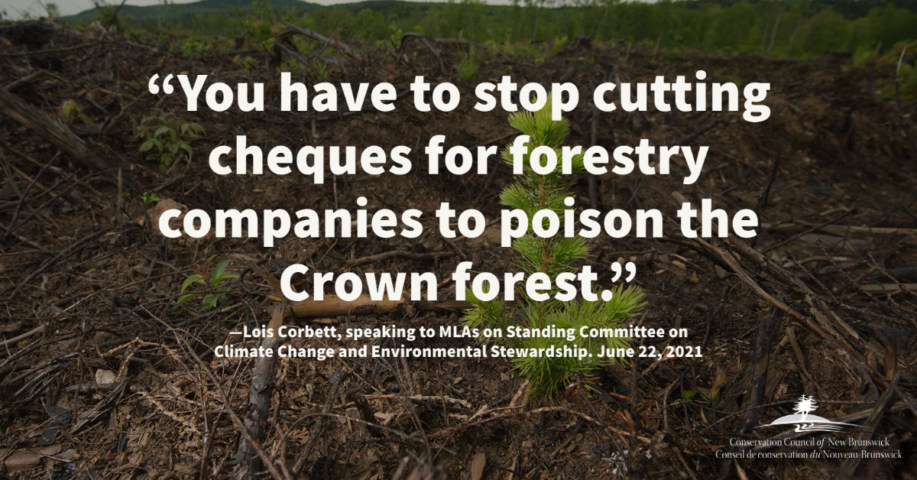Find links below to written submissions and videos of presentations made during the four days of hearings
SEPTEMBER 2021 UPDATE: The standing committee examining glyphosate use in New Brunswick resumed hearings on Sept. 7, inviting presentations Indigenous leaders across the province. The leaders called on the committee to ban glyphosate spraying in the woods as the poison harms forests, rivers, plants and animal life and impacts the plants and berries traditionally used by Indigenous peoples for food and medicine. You can watch the Sept. 7 presentations in full here. The hearings resume on Friday, Sept. 10. Find the link for the livestream here.
The Standing Committee on Climate Change and Environmental Stewardship heard from experts on the use of glyphosate-based herbicides in New Brunswick between June 22-25, 2021.
MLAs on the committee heard presentations from environmental groups, including the Conservation Council of New Brunswick, scientists, citizens groups, representatives from the agriculture and forestry sectors, and Steve Ginnish, director of forestry and natural resources with the Mi’gmawe’l Tplu’taqnn.
The committee also received written submissions from experts outside the province.
The majority of presenters focused comments on glyphosate’s effect on the Crown forest in New Brunswick, including its impact on wildlife and the diversity of life in the forest.
The all-party committee of 11 MLAs is now reviewing the presentations and written submissions before making recommendations to the Legislative Assembly later this year.
Our Executive Director Lois Corbett told the committee that glyphosate is a symptom of a broader problem in our forests: outdated management practices, including large-scale clearcutting. She called on MLAs to recommend a ban on glyphosate use in the Crown forest and an update of the Crown Lands and Forests Act to ensure forest management is fair to citizens, First Nations and private woodlot owners. You can watch her full presentation here. Read a summary of her comments, including slides from her presentation, here.
In light of new studies outside New Brunswick showing glyphosate stays in water longer than the chemical industry said it would, professors Céline Surette and Luc Tremblay of the Universite de Moncton called on the committee to require testing in watersheds where spraying occurs to determine if glyphosate is present in our rivers and waterways. The province does not currently test for glyphosate in water. Watch their full presentation here.
Eel Ground First Nation forester Steve Ginnish told the committee spraying is impacting his peoples’ ability to hunt and forage in their traditional territories. Watch his full presentation here.
Francine Levesque of EcoVie Group spoke to the loss of diversity in the forest and called on the committee to recommend a ban on spraying and changes to New Brunswick’s approach to forest management. Watch her full presentation here.
Stop Spraying New Brunswick’s Caroline Lubbe-D’Arcy told the committee about the effect herbicide spraying is having on our forest as witnessed by New Brunswickers who love to spend time in the woods, and called on the committee to exercise the precautionary principle in banning herbicide spraying on the forest. Watch her full presentation here.
Former government wildlife biologist and instructor at Maritime College of Forest Technology, Rod Cumberland, spoke about the effect herbicide spraying has on the health of deer and moose in the province and the Pest Management Regulatory Agency’s failure to protect the public from harmful herbicides and pesticides. Watch his full presentation here.
Click here to watch a YouTube playlist we’ve created with the full presentations made by groups and scientists at the committee, including Lois Corbett, Dr. Matt Betts, Dr. Céline Surette and Dr. Luc Tremblay, Steve Ginnish, Francine Levesque (Group EcoVie), Dr. Allen Curry (UNB), Dr. Caroline Lubbe-D’Arcy (Stop Spraying NB), Rod Cumberland (retired provincial deer biologist), and Mike Legere and Andy Barrieau (Forest NB).
Click here to access presentations and written submissions to the committee in PDF format.
Click here for media coverage of the hearings.

